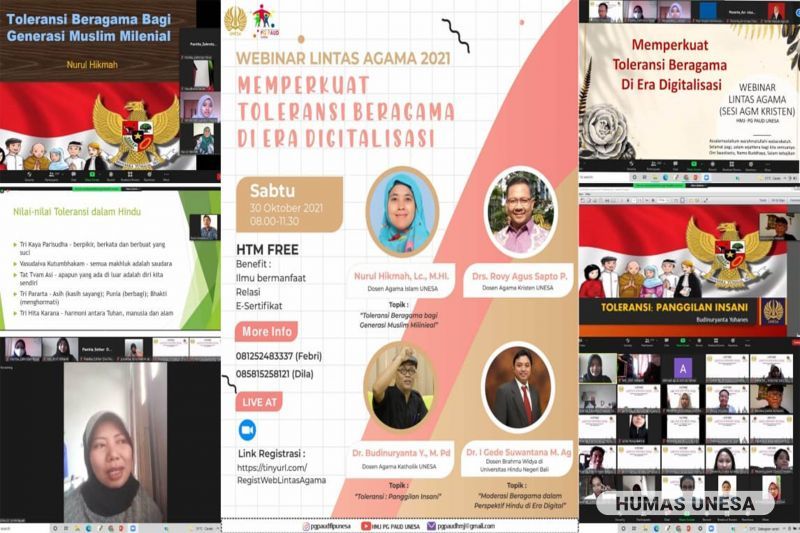
www.unesa.ac.id
Unesa.ac.id, SURABAYA–Creating tolerance between religions is a shared responsibility. The attitude of mutual understanding and respect is not to be billed to other parties, but must be equally shown in the form of daily behavior. Young people also have to take part to make it happen. For this reason, HMJ PG PAUD Universitas Negeri Surabaya held an Interfaith Webinar with the theme "Strengthening Religious Tolerance in the Digitalization Era 2021" on Saturday (10/30/2021).
The activity was attended by 275 student participants from various universities in Indonesia. Velita Haryaningrum as chairman of HMJ PG PAUD UNESA said that one of the foundations of the webinar was to increase tolerance towards others as religious people and uphold the value of living with mutual respect, respect and doing good to others regardless of race, ethnicity, group and religion.
Sri Widayati, M.Pd., Head of the Laboratory of the PG PAUD UNESA Department stated that in this digital era, the sense of unity and oneness is often tested by spreading information about ethnicity, race and even religion on social media. Not even a few are in contact with religious fanaticism which can ignite emotions and cause hatred for some community or religious groups. "I hope that young people must be at the forefront of fostering a sense of tolerance in the community, if there is information that contains divisive elements, it is immediately stopped and corrected if the information is not true," he said.
The first speaker, Nurul Hikmah, Lc., M.HI., as a Lecturer of the Islamic Court of the State University of Surabaya who delivered material on 'Religious Tolerance for the Millennial Muslim Generation'. He stated that Allah SWT created this world and life in various forms; different nations, body shapes and skin colors and languages are also diverse. "God created the difference, why do we as humans even question it?," he said.
Differences, he continued, are not reasons to divide the sense of unity, it is precisely from differences that they are reasons to unite and embrace one another. "The attitude of intolerance that has damaged the harmony so far is actually not because of differences, but because of us and our own selfishness," he said.
Meanwhile, Drs. Rovy Agus Sapto Priyono as a Lecturer of the Christian Constitutional Court of the State University of Surabaya said that from a Christian perspective, human tolerance is created in the image and likeness of God, not in physical form, but in the form of character and will that has noble values. According to him, in this information and digital era, it is better for the younger generation to develop a friendly spirit and attitude, be honest with each other, honor each other, seek and develop together opportunities to cultivate a great spirit as a unitary state of the Republic of Indonesia.
Dr. Budinuryanta Yohanes., M.Pd., Lecturer of the Catholic Constitutional Court of the State University of Surabaya, explained that one of the challenges of brotherhood in this digital era is the opening of space for freedom on one side and a crisis on the other. One of the causes of the crisis is the infrequent relationship and face-to-face communication because communication has shifted to online spaces. “Even though we visit each other infrequently and we communicate a lot via short message applications or social media. However, we must not forget each other, instead we must strengthen each other both in solidarity and religiosity," he added.
Tolerance, in Hinduism also gets a fairly high portion. The first Hindu values of tolerance according to Tri Kaya Parisudha are that it begins with thinking, when thoughts are good, speech will be good. When thoughts and words are good, behavior will also be good. Second, Vasudaiva Kutumbhakam means that all beings are brothers who come from God. Third, there is the principle of Tat Tvam Asi which means that whatever is outside of oneself is not much different from oneself. Therefore, we must respect and respect each other. [UNESA PR]
Share It On:






